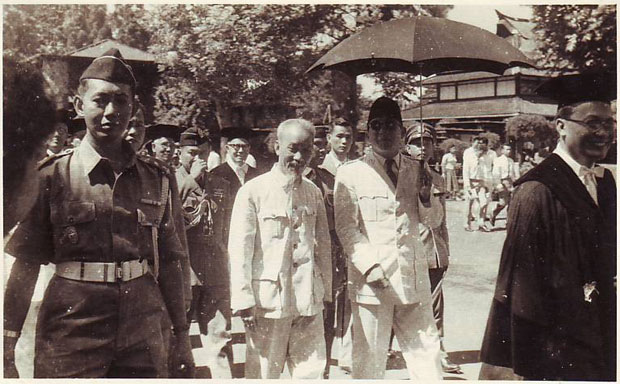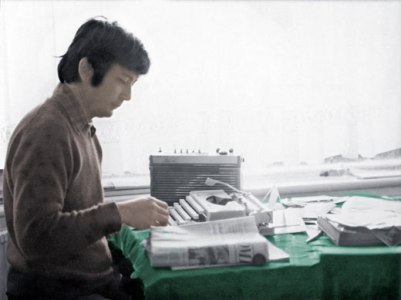The Canadian author-historian, Margaret Macmillan, who wrote the seminal work “Paris 1919” on the 6-month long international conference in Versailles at the end of World War I, wrote of a Vietnamese kitchen assistant working at the Ritz Hotel in Paris who unsuccessfully sought to have his country recognized by the great powers among the swirling hustle of the major powers, including France, Britain and the emergent United States. The kitchen assistant, a gangly, thin but determined 28 year old, was Ho Chi Minh, who in September 1945, declared Vietnam independent following the surrender of Japanese forces to the US at Tokyo Bay.
Later, in the 1950s, as French colonial forces sought to regain control over Indo-China, Ho Chi Minh and his “rag tag of black pajama and sandals” guerillas defeated the pride of French intellectual, bureaucratic and military elite at the garrison of Dien Bien Phu in May 1954, Ho Chi Min, aided by the military legend, Vo Nguyen Giap, rose to world wide political and military fame. Ho Chi Minh participated in the April 1955 Asian African Conference in Bandung, Indonesia, along with Jawarhalal Nehru (India), Zhou Enlai (China) Gamal Abdel Nasser (Egypt), Kwame Nkrumah (Ghana), and Sukarno (Indonesia).

In the early 1960s, Ho Chi Minh visited Indonesia and was conferred an honorary doctorate at Bandung. Ho Chi Minh spoke of the most important education he received was not from schools, colleges or universities but from “The School of Life” which tested his determination, resilience and moral strength. Indonesian president Sukarno, who attended the ceremony later spoke to students in Jakarta, which I attended as a second year student at the University of Indonesia. Sukarno spoke warmly about “this simple and humble man who never graduated from college or university” but possessed the determined quality of humanity that conquered the nation whose sin was to remind France to live up to its own commitment to Liberte, Egalite, Fraternite”. I have never forgotten that image of both Ho Chi Minh and Sukarno at that very moving moment of first generation leaders of Vietnam and Indonesia who wrested power rather than being granted independence by a stubborn yet receding colonial power.
I have often wondered how third and fourth generation Vietnamese, Indonesian,
and indeed African and Latin American, European and American leaders view the historical spectrum facing each country’s current predicament? Can they recapture the spirit that once moved their forbears into bring out the best of their intellectual courage and moral fibre to the fore? Can and will they reinvigorate the quality of public service in their personal, social and professional conduct as leaders? Can they withstand the forces of predatory financial power that erodes their determination to maintain political and cultural space that underlies the power of humility? Will they heed John F Kennedy’s call in his inaugural address more than 50 years ago that “those who do not allow peaceful revolution possible will make violent revolution inevitable?”

Good article.
Especially paragraph three where we as a third generation, fourth and fifth were free from colonialism and able to look at patterns of thinking as a free state in international relations and equality of justice in state relations in economic, social, political, security.
“history will repeat Colonialism pack and stay there and do the same “, the statement that I captured from JFK.
but there is little question to you Sir.
How this pattern can be championed equality now and especially in the new era quantum leap from Asia-Africa meanwhile we see weakness in the bilateral country organizations.
Thanks
Jiwamalam
Dear Professor Juwono:
I’ve always amaze and learn from your wisdom and from the breadth and the depth of your worldview. Thank you for sharing your concern in this article. A perfectly written, reminding us young generation on the challenges that we are to embrace and of that we have to conquer.
As Nehru once said, “if we are to be India’s soldiers, we have India’s honor in our keeping, and that honor is a sacred trust,’ while Lee Kuan Yew said, “we need people with vision, imagination, agility and of a helicopter view, who can see the broad picture.” I believe these wisdom also apply and can be a source of light to the third and fourth generations of Indonesians.
I would like to seek your views.
While inevitable changes are currently underway in this world and such changes will accentuate the changes that are already in motion in Indonesia, in your view, do you agree that revitalization of our identity as a nation and state is the most pressing national agenda?
How would you suggest the current Government or the Government to come to be more affirmative to potential horizontal and vertical conflict, which already going on, where democracy are being used as a disguise to groom undemocratic movements and ideals of which against the democracy and the whole identity of Indonesia itself? How can we escape this while maintaining to “allow peaceful revolution possible,” and yet jettison, “violent revolution (from becoming) inevitable”?
Thank you, Professor.
Best regards,
Selwas
Humility looks powerful in the ends, but for person who do this, the process is not easy. It is so hard,and may be would sacrifice anything even his freedom
Dear responders:
Every person of every generation must define integrity according to his/ her/ cultural context, complicated by the myriad flows of current media mix defining what constitutes integrity/ Today,s generation faces more inputs of disparate notions of honesty and clean break from past notions of what is right, proper and appropriate.
What constitute sufficient notion is what is enough? How long can the temptations of improper conduct can we withstand? It is never easy to define since the goalposts themselves shifts with the nature of what constitute the right decision..